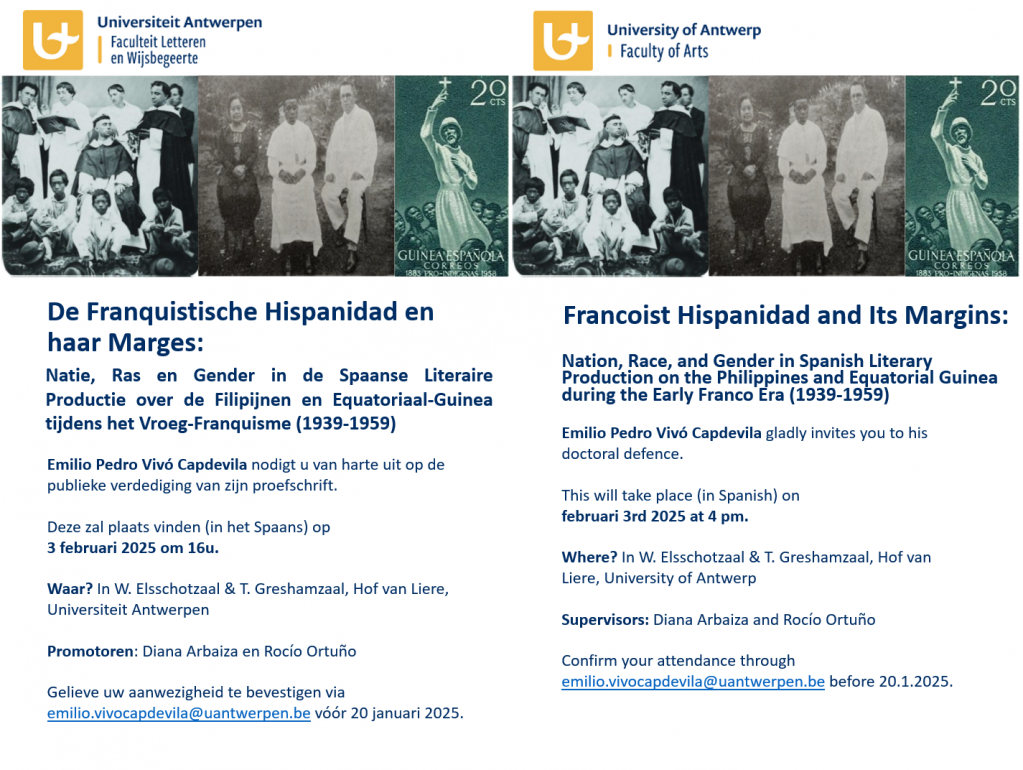Emilio Pedro Vivó Capdevila nodigt u van harte uit op de publieke verdediging van zijn proefschrift.
Deze zal plaats vinden (in het Spaans) op
3 februari 2025 om 16u.
Waar? In W. Elsschotzaal & T. Greshamzaal, Hof van Liere, Universiteit Antwerpen
Promotoren: Diana Arbaiza en Rocío Ortuño
Gelieve uw aanwezigheid te bevestigen via emilio.vivocapdevila@uantwerpen.be vóór 20 januari 2025

*** English abstract below
Nederlandstalig abstract
Deze thesis analyseert tien literaire werken over Equatoriaal-Guinea en de Filipijnen uit de eerste periode van het Franco-regime (1939–1959). De werken omvatten zes literaire genres: reisromans, missionaire romans, essays, romans geïnspireerd op de koloniale oorlogen rond 1898, plantageromans en biografieën. Elk hoofdstuk vergelijkt twee werken per genre, waarbij één werk per gebied wordt geanalyseerd. De studie belicht gedeelde thema’s en contrasterende maar complementaire elementen in de representaties van beide gebieden en onderzoekt de koloniale ideologieën die worden overgebracht in relatie met gender, ras en natie.
De thesis stelt dat de representatie van zowel Equatoriaal-Guinea als de Filipijnen in de Spaanse literatuur van de tijd opvallende overeenkomsten vertoont, ondanks de verschillende relaties tussen het regime en elk gebied (terwijl Equatoriaal-Guinea een Spaanse kolonie bleef, kregen de Filipijnen in 1946 hun onafhankelijkheid van de VS.). De analyse suggereert dat de Franquisme negentiende-eeuwse raciale ideologieën nieuw leven inblies en een geïdealiseerde voorstelling van het Spaanse koloniale verleden in de Filipijnen gebruikte als bewijs van Spanje’s welwillende beschavingsmissie in Afrika en de noodzakelijke eenheid tussen kerk en staat in de metropool. De thesis betoogt dat de relaties met de Filipijnen en de culturele erfenissen van hun Spaanse kolonisatie zowel het beleid van het Franco-regime in Equatoriaal-Guinea als het bredere kader van het Spaanse koloniale discours diep beïnvloedden.
Hoewel het Franco-regime openlijk racistische retoriek tegenover de Filipijnen vermeed en hen afschilderde als een meer beschaafde en Hispanische model-natie, werden nog steeds stereotyperingen en literaire genres uit de koloniale periode gereproduceerd, vooral als er gesproken werd over de niet-katholieke inwoners van het archipel of zijn onafhankelijkheidsoorlog. De bevolking van Equatoriaal-Guinea werd daarentegen als raciaal inferieur afgebeeld en afhankelijk van “verheffing” door Spaans kolonialisme. Deze “verheffing” werd gepresenteerd als vergelijkbaar met wat gebeurde met Spaanssprekende Filipino’s, maar de mogelijkheid en timing van acculturatie, evenals hoe de metropool hiermee moest omgaan, bleven onderwerp van debat.
De thesis concludeert dat, ondanks de claims van exceptionalisme, het Franco-regime sterk leunde op Europese koloniale ideologieën en deze aanpaste aan zijn symbolische visie op Spanje’s imperiale verleden Dit resulteerde in een Eurocentrische beschavingshiërarchie met fascistische en katholieke Spanjaarden aan de top en Afrikanen en “ongeaccultureerde” Filipino’s aan de onderkant. Bovendien toont deze thesis aan dat, door mimetische subjecten (gekoloniseerde eliten) hogere posities binnen deze hiërarchie toe te laten, de Franquisme een ambivalent narratief creëerde dat zowel zijn kolonisatie van Afrika als zijn diplomatieke en culturele banden met voormalige Spaanse koloniën legitimeerde.
English abstract
This thesis analyzes ten literary works about Equatorial Guinea and the Philippines from the early Francoist period (1939–1959). These works span six literary genres: travel novels, missionary novels, essays, novels inspired by the colonial wars around 1898, plantation novels, and biographies. Each chapter compares two works per genre, analyzing one work from each region. The study highlights shared themes, contrasting yet complementary elements in the representations of both territories, and examines the colonial ideologies conveyed in relation to gender, race, and nation.
The thesis argues that the representation of both Equatorial Guinea and the Philippines in contemporary Spanish literature shows notable similarities despite the differing relationships between the Francoist regime and each territory (while Equatorial Guinea remained a Spanish colony, the Philippines gained independence from the U.S. in 1946). The analysis suggests that Francoism revived 19th-century racial ideologies and employed an idealized portrayal of the Spanish colonial past in the Philippines as evidence of Spain’s benevolent civilizing mission in Africa and the necessary unity between Church and State in the metropole. The thesis contends that Spain’s historical relationship with the Philippines and the cultural legacies of its Spanish colonization deeply influenced both Francoist policy in Equatorial Guinea and the broader framework of Spanish colonial discourse.
Although the Francoist regime avoided overtly racist rhetoric toward the Philippines and portrayed it as a more civilized, model Hispanic nation, stereotypes and literary genres from the colonial period were still reproduced, particularly in discussions of non-Catholic inhabitants of the archipelago or the Philippine War of Independence. In contrast, the population of Equatorial Guinea was depicted as racially inferior and reliant on “elevation” through Spanish colonialism. This “elevation” was presented as similar to what had supposedly occurred with Spanish-speaking Filipinos, but the possibility and timing of this acculturation—and how the metropole should respond to it—remained subjects of debate.
The thesis concludes that, despite its claims of exceptionalism, the Francoist regime heavily relied on European colonial ideologies, adapting them to its symbolic vision of Spain’s imperial past. This resulted in a Eurocentric civilizational hierarchy, with fascist and Catholic Spaniards at the top and Africans and “unacculturated” Filipinos at the bottom. Furthermore, this thesis shows that, by allowing mimetic subjects (colonized elites) to occupy higher positions within this hierarchy, Francoist Spain created an ambivalent narrative that legitimized both its colonization of Africa and its diplomatic and cultural ties with former Spanish colonies.